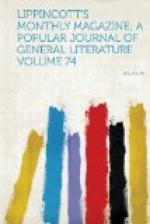I have never tried to analyze the influence for good George had over us, or account for it in any way, nor do I care to. I have always considered his friendship for me as one of the pleasantest and most profitable experiences of my life in Lincoln. Perry and I were always more close and loving friends, and cared for George with a silent but abiding sense of gratitude in addition to the other sources of our affection for him, after he showed us the boyish foolishness of our quarrel about Lucretia Knowles. Of course I ought not to have grown angry at Perry’s good-natured cynicism; for how could he have imagined that I cared for her? Though I sometimes think, even now, that Perry was indeed anxious lest I should fall in love with her, and wanted to ridicule me out of the notion, and I fear, in spite of his acquaintance, that he disapproves of our engagement. I wonder if he will ever get over his prejudice against women. The dear old fellow! if he would only consent to know Lucretia better I am sure he would.
One night in the winter before we graduated, Perry and I went with George to the Third House, which is a mock session of the legislature that the political wags of the State take advantage of to display their wit and quickness at repartee and ability to make artistic fools of themselves. If it happens to be a year for the election of a senator, as it was in this case, the different candidates are in turn made fun of and held up to ridicule or approval; and the chief issues of the time are handled without gloves in a way that is always amusing and often worth while in showing the ridiculous nature of some of them. The Third House is usually held on some evening during the first or second week of the session, and is opened by the Speaker calling the house to order with a thundering racket of the gavel—“made from the wood of trees grown on the prairies of the State”—and




